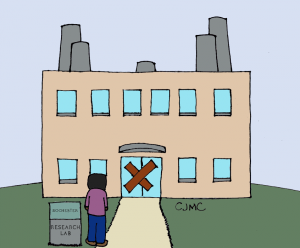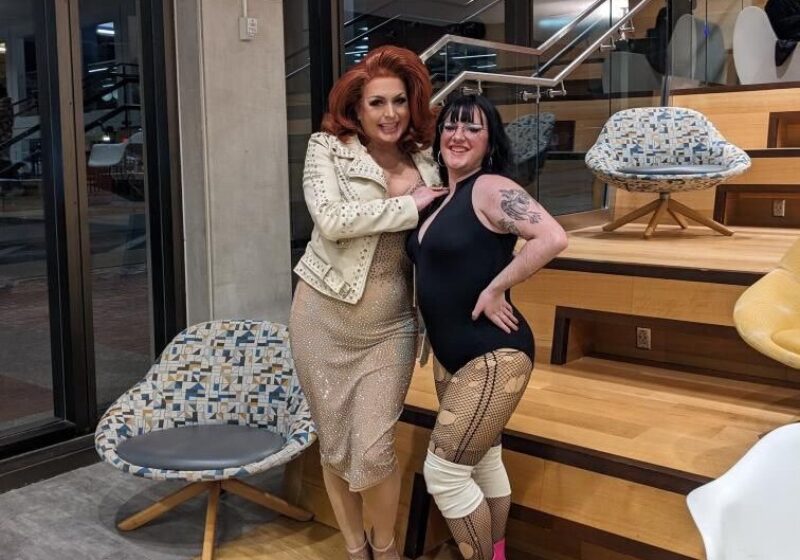The following article has been modified since its original print publication at the author’s request. (Updated: May 31, 2015)
“The lab will be closing down,” said Dr. Lisa Opanashuk, a Principle Investigator (PI) at University of Rochester Medical Center. The room went silent.
Nobody knows what happens when a lab closes down.
Since 2008, cuts to the nation’s research budget have been thrown at our faces. Directors and senators have clamored about the value of such research in an information age and the delays in developing an Ebola vaccine, yet few have recognized the effect of research on employment.
Still, those who comment on employment simply focus on the surface fear of unemployment faced by many.
Scientists are social people. When we’re not in the lab, toiling away at experiments, we’re talking with our colleagues. We talk endlessly—forever at the grindstone of discovery—planning new experiments and directions for our work, chit-chatting away the downtime between gels or experimental timepoints.
But every five years, academic researchers lock themselves in their offices for weeks to draft new proposals for R01-type grants—the main type of grant funding for biomedical research.
“20 years ago, the average PI had a one-in-three chance of having his/her grant approved,” said Dr. Opanashuk. “Today the odds stand at about one in six.”
The consequence, many scientists say, is that plenty of good proposals go unfunded, and good labs close down.
When Dr. Opanashuk first announced to her laboratory over the summer of 2013 that she did not get her R01 application approved—one year before the lab closed down—it wasn’t a death sentence. Yet, the bell tolled.
The lab would be on a “transition-period” budget until a new R01 was approved. I had to re-draft my research plan into a low-budget version.
While I wasn’t employed by the lab and wouldn’t rely on a new grant for any sort of income, I wanted to be. I needed money for my 2014-2015 Take Five year, since I would be living off-campus and without support from my parents. So, this transition period was bad news.
I wanted to go look for a job in another lab, but without a reference from Dr. Opanashuk, things would be difficult.
She gave me more opportunities and responsibilities than most undergraduates, and it felt wrong to try to jump ship without knowing whether it was sinking.
In the fall of 2013, a few months after the initial grant rejection, Dr. Opanashuk resubmitted her R01. This was just around the time that sequestration resulted in a government shutdown. Grant reviews were delayed.
Our grant ended up not being renewed. We had one more shot in May. We would know by next June or July.
In the moment following Dr. Opanashuk’s July 2014 announcement, I felt relieved. Now I didn’t have to explain why I wanted to leave the lab: that I wouldn’t have to face her in the hallways, when I would be working somewhere I could earn a living as a Take Five student.
After feelings of relief, I started to wonder: what is going to happen to Carrie, the graduate student who just joined the lab? What about Bryan, the technician who had been with Dr. Opanashuk from the beginning? What about the lab space or all those mouse brains sitting in vials?
Dr. Opanashuk later said how difficult this whole thing was for her, forcing her students and employees to find new labs. She had found work as a Health Sciences Officer for Veterans Affairs, but still felt sad about the whole thing.
It turned out that Carrie had to find a new lab and even come up with a new thesis proposal. She lost about six months of work. “It really took the wind out of my sails,” she said. “It’s kind of a thing you hear whispered through the grapevine. You never think that it will happen to you.”
When asked about her future, Carrie responded: “It definitely solidified my decision not to go into academia…it’s so stressful trying to get funding. I’m leaning more towards an industry job.” Today, “less than 17% of new PhDs in science, engineering and health-related fields find tenure-track positions within 3 years after graduation,” said a recent paper out of MIT.
For Bryan, 10 years of good performance reviews and loyalty to UR left him expecting to have some help finding another lab to work for. While Dr. Opanashuk and some administrators put in personal effort to help him, the UR did not provide much official help. Still, he found a job at another UR research lab within two months of the lab closing down.
As for me, the future wasn’t as well defined. I now had the support of Dr. Opanashuk in my job search, but she seemed adamant about her plan to have me continue my project in the soon-to-be empty lab space.
After Dr. Opanashuk’s announcement, July was a tense month.
Slowly ending my experiments—freezing down cells I had cultured, analyzing my last pieces of data—I still didn’t know what was going to happen.
I started my one-month vacation during the month of August without a plan for the next year. I was waiting.
While I was away during August, the lab actually shut down.
Bryan finished his experiments, and slowly, almost like an estate sale, researchers from other labs came by to see what equipment and supplies they might be able to take for their own work. They took nearly everything, even the (unanalyzed) mouse brains.
When I came back in late August, I felt good. Dr. Opanashuk had managed to find a way for me to keep working on my project in the same labspace, and with funding to help me pay for my things, both in lab and in my personal life.
I was now under the supervision of Dr. Kerry O’Banion, a professor in the Neurobiology and Anatomy Department and Co-PI on one of Dr. Opanashuk’s pilot grants.
A pilot grant is money intended to fund experiments that would provide important preliminary data for a larger grant proposal. A Co-PI can simply be thought of as something like a “cosigner” for the proposal, someone who agrees to use some of his/her lab’s resources to help the main PI complete the grant’s proposed objective.
In exchange, they receive some of the funding and recognition from any data publications.
On Tuesday, I defended my honors thesis, and officially wrapped up my project.
The lab is almost entirely empty now. All of the mouse brains and tissue sections are gone. The leftover equipment and reagents—told too old to be repurposed—have been piled onto whatever surfaces people could find.
There’s nothing left in the drawers.
Adham is a Take Five Scholar.





